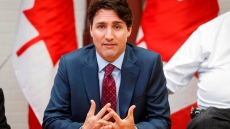OTTAWA — Federal Environment Minister Catherine McKenna says her role is as a "kind of convener" among disparate factions of the progressive push for climate policies.
McKenna appeared Friday at a panel discussion on environmental policy at the Progress Summit hosted by the Broadbent Institute, a left-leaning think tank.
She was joined on the stage by Alberta Environment Minister Shannon Phillips and Vancouver city councillor Andrea Reimer, a lineup that illustrated there's no unanimity of thought on climate action even among those pointed in the same direction.
Phillips represents a sea change in Alberta politics with an NDP government that's imposing carbon pricing and a hard cap on greenhouse gas emissions, while still pushing for expansion of the oilsands and new market access.
Reimer, by contrast, sits on a city council that is striving to make Vancouver the greenest city on Earth and is resolutely against the construction of new pipelines.
The Trudeau Liberals have made combating climate change a top government priority, but continue to frustrate some in the environmental movement with their qualified support for some as-yet, undefined new oil pipeline.
Reimer called new pipeline construction "probably the big elephant in the room here today" in her opening remarks, sparking hoots of applause from the audience.

"Climate change is not a partisan file, it should not be a partisan file," McKenna responded, speaking after Reimer.
"Everyone knows we need to take action and we need to take action now. So I see my job as a kind of convener."
In a question-and-answer session that followed, McKenna said the federal government is pushing the transition to a low-carbon economy. But she worries about alienating those Canadians who want action but fear economic disruption — saying she's trying to "keep everyone on board."
"We need transition to a low-carbon economy, but we can't do it overnight. I'm a realist on this. There are a lot of people who have lost jobs in Alberta. I'm not saying that means we destroy our planet, but we do need to be thoughtful about how we move forward."
McKenna acknowledged she was "preaching to the converted" at the Progress Summit, but said many other Canadians "are a little bit there."
They want climate action, said the federal minister, "but if what we end up doing has a huge, immediate, dislocating affect on the economy, where tons of people lose jobs, I'm losing everyone. I'm losing them."
Phillips, for her part, won applause when she said success on the low-carbon transition will not come by taking the current oil patch malaise "and make it worse. That is not the way we are going to succeed."

But it was Reimer with her no-pipeline, no-how message who carried the room.
"Way too much risk, no benefit — on a planet that is dying because we're burning fossil fuels. So the answer seems fairly clear: let's put our energy into a debate about renewable energy," said Reimer, drawing the panel's longest and biggest applause of the afternoon.




